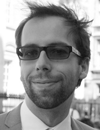Ricardo Henriques,
Group Leader,
University College London
I chose to pursue studies in Particle and Quantum Physics at the Lisbon Faculty of Sciences (FCUL). After graduating, I became increasingly interested in the application of Optical Physics and Image Analysis into the field of Cell Biology. Since then I have been involved in research in and with Optical Microscopy. In 2008, I started a Ph.D. in the field of Super-Resolution Microscopy with the group of Dr. Musa Mhlanga, divided between South Africa (CSIR) and Portugal (IMM); during this time I became a long standing visiting scientist at Institute Pasteur Paris, having done most of my research there at the group of Dr. Christophe Zimmer. One of the major focuses of my Ph.D. was to democratize Super-Resolution Microscopy, providing analytical and optical tools allowing easy access to this new methodology. One of my publications – QuickPALM – presented an algorithm that easily enabled Super-Resolution analysis, rapidly becoming a standard in the field. During this time I consulted for companies such as Andor Technology, Olympus Microsopy and BitPlane, who have integrated part of the technology I have developed in their systems. In 2011, I have done a short postdoc at Institute Pasteur, studying the formation of the immunological synapse and its subversion by HIV-1 infection. In 2013 I became a research group leader at the University College London. As a group, our research is divided between cell biology, optical physics and biochemistry. We focus on biological problems that cannot be challenged with current imaging technology, and thus we set forth to develop the analytical and optical tools to answer these questions. Some of our favourite open questions surround figuring out how HIV-1 enters cells, probing and remodelling membranes. To do so, we are working on new classes of fluorescent probes and high-speed cell friendly Super-Resolution methods that although optimally designed to answer our focus questions, will have broad applications into Cell Biology research.
|

|
|

 Add to Calendar ▼2016-06-15 11:00:002016-06-15 12:00:00Europe/LondonDemocratising Live-Cell High-Speed Super-Resolution MicroscopyBioimaging: From Cells To Molecules 2016 in Cambridge, UKCambridge, UKSELECTBIOenquiries@selectbiosciences.com
Add to Calendar ▼2016-06-15 11:00:002016-06-15 12:00:00Europe/LondonDemocratising Live-Cell High-Speed Super-Resolution MicroscopyBioimaging: From Cells To Molecules 2016 in Cambridge, UKCambridge, UKSELECTBIOenquiries@selectbiosciences.com Add to Calendar ▼2016-06-14 00:00:002016-06-15 00:00:00Europe/LondonBioimaging: From Cells To Molecules 2016 Bioimaging: From Cells To Molecules 2016 in Cambridge, UKCambridge, UKSELECTBIOenquiries@selectbiosciences.com
Add to Calendar ▼2016-06-14 00:00:002016-06-15 00:00:00Europe/LondonBioimaging: From Cells To Molecules 2016 Bioimaging: From Cells To Molecules 2016 in Cambridge, UKCambridge, UKSELECTBIOenquiries@selectbiosciences.com